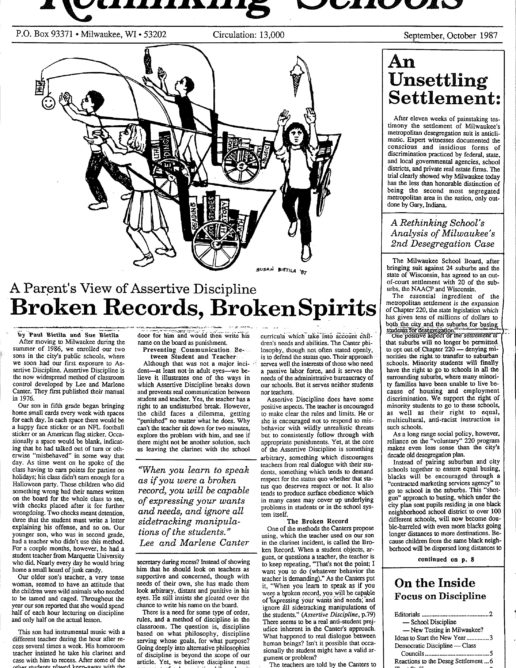Questionable and Coming Soon
Across the Board Tests
Increasingly the Milwaukee Public Schools have come under pressure to develop a more rigorous curriculum and to be more accountable for the achievement levels of students. We believe these ideals are both laudable and realistic. It is correct for the administration to respond to such public pressure.
However, the quality of that response may be cause for alarm. Evidence suggests that MPS is instituting major changes throughout the curriculum without involving parents, teachers, students, and even school board members in debate about crucially important issues such changes raise.
Top officials would like to see the entire curriculum “objective based” so that student progress would be clearly measurable through “criterion-referenced tests.”
While this sounds innocuous (even constructive) enough, experiences of similar types of “reforms” in such cities as Denver and Cincinnati show that the consequences might be negative. Reducing curriculum to “measurable objectives” (as those are currently defined can have the effect of strait-jacketing creative teachers and test-driving the entire curriculum.
Since all too many tests measure knowledge of small, isolated facts and not the larger conceptual and critical understanding which is the foundation of good education, an overemphasis on testing could actually lead us to base our curriculum on woefully low, distorted standards. Nor is it true that such tests establish a phasic minimum standard which children must meet before they can proceed to higher order thinking. It is easy to test a child’s knowledge of dates and facts in history, but the child who knows a lot of these may actually know less than the child who can weave fewer key facts into a broad understanding of historical trends. Merely teaching facts takes time away from teaching conceptual processes.
We’ve already seen two examples of the way such a policy (however well-meaning) can go awry, having devastating effects on our curriculum. At the grade school level, reading instruction is tied closely to a program of testing based on the basal readers. Yet the basal reading program is so boring, fragmented and workbook-oriented that many children learn to hate reading. The skills and information tested are so low-level that students are not stimulated to develop the conceptual skills they are perfectly capable of mastering (and enjoying). Few teachers can find the time to introduce whole books and more meaningful reading activities.
At the high school level, more and more English teachers are complaining that the competency test has turned the English curriculum into a narrow rote program of drilling students for a test that does not measure what is really important for students to learn.
Clearly a program of widespread testing where every course would be tied to test results from kindergarten to grade twelve needs serious debate. We need to explore whether there are tests that measure the things we value most highly. And we need to consider whether testing is the way to go at all. We may well be able to develop superior methods for improving the curriculum and holding schools accountable to high standards of achievement.
Meanwhile MPS is moving rapidly toward implementation of an across the board testing program without thoughtful attention to these concerns. Last spring, 260 teachers participated in “filtering committees”, designed to review “objectives” for every grade and subject area which could then be tested in an “outcome based curriculum” scheme. A number of participants report that this process was chaotic and rushed. Teachers were unclear about the ultimate purpose of this work. Some groups based the objectives on-standardized tests, some linked them to the current textbooks, and a few generated their own lists of curriculum objectives. Very often the teachers only reviewed learning objectives already written by Central Office personnel. Most importantly, teachers were never given a chance to confront the more fundamental question of whether the testing program should be established at all.
Recently, $32,000 was allocated to contract with a firm to correlate these objectives with tests. One school board member reports that this measure was passed through quickly as an amendment to the budget without the opportunity for careful consideration even at the school board level.
The goals we set for our children’s learning and the system by which those are implemented and monitored are too important to be dispensed with so haphazardly. Our first priority should be the setting of high standards for our children based on what we want them to learn, rather than what is easily measurable. Then we need to find ways to provide incentives and support so teachers and students can reach those standards. In some cases we may want to monitor progress with tests — not just any tests, but carefully selected ones. The greatest tragedy would be to spend precious energy and resources tying the curriculum to ill-conceived (but readily testable) standards diverting our efforts from the kind of meaningful change we all so justly crave.

